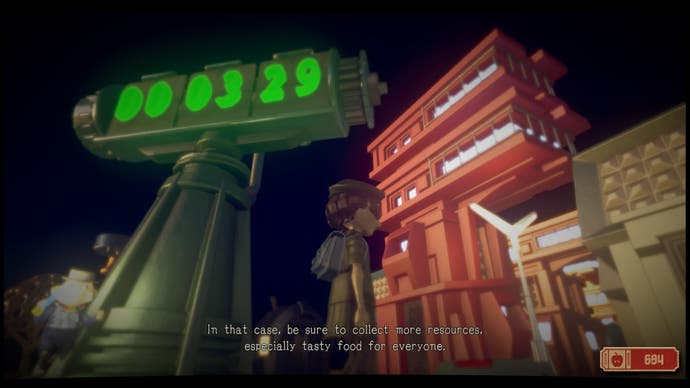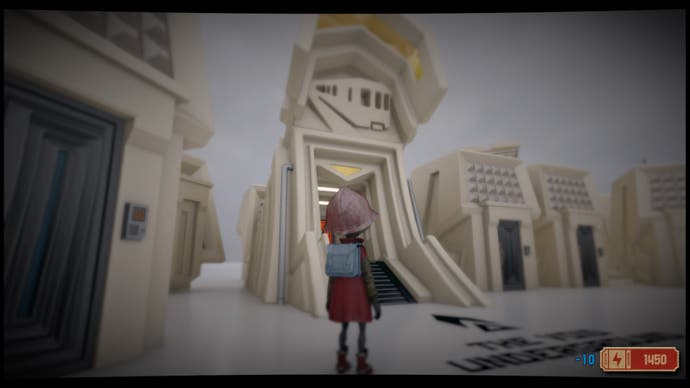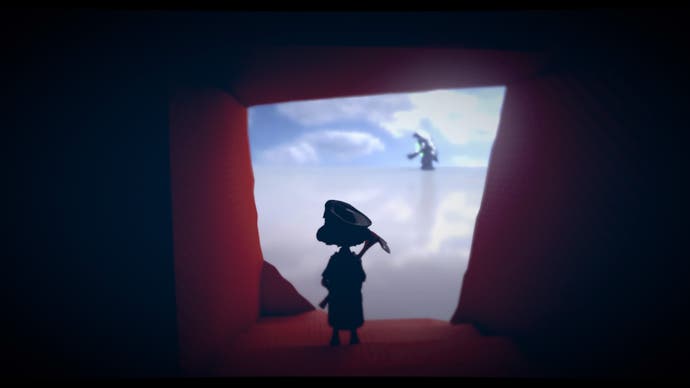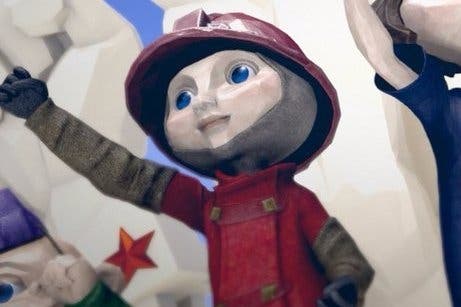The Tomorrow Children: A riddle, wrapped in a mystery, inside an enigma
Socialist networking.
If you judge a game by the questions it makes you ask when you're playing - and I appreciate that nobody actually judges a game like this - then The Tomorrow Children is quite something. "Why do I need a house?" That was an early question. "How do I get money?" "Why do I need money?" Somebody (and, sadly, I think that somebody was me) was having a strange kind of awakening.
And it has not always been an easy kind of awakening. I have learned things about myself playing The Tomorrow Children, and none of these things have been good. Just yesterday I was wandering around the town that so much of your time in The Tomorrow Children is spent building up and improving. I was proud of what had been achieved - mostly, granted, by other people - but that pride clearly had limits. And it turns out that those limits were other people. Around noon, monsters from the Void that surrounds the town suddenly decided to attack. My house, which I had just painted, looked like it might shortly be catching on fire. Fellow comrades (a tautology?) scattered towards turrets and other defensive stations. I, however, looked at the oncoming beasts, figured everyone else could just about hold them off, and exited back to the start screen and went to get a Pop-Tart. What can I say? Diagnosis Murder was about to start.
The Tomorrow Children, in other words, is a fascinating and bewildering prospect. On paper, it sounds pretty straightforward - once you put the Soviet iconography to one side, anyway. This is surely a playful mash-up of popular elements, in which you join up with other players online to rebuild towns that have been destroyed during a Soviet experiment that fragmented reality itself and left people lost in a hideous Void, filled with monsters. Playing as a kind of virtual citizen, you venture out into this Void whenever "islands" of matter appear in the glossy whiteness of the horizon, and you mine these islands for materials to bring back to town so that you can craft new buildings and generally fix the place up. Occasionally, you find matryoshkas out there in the Void. Bring these guys to town and - once you've built the necessary machine - you can transform them back into humans. That's it, really: improve the town and boost the human population count, and occasionally defend the place from attacks by monsters of the Void. Meanwhile, other towns are doing the same thing in their own instances, and you can visit them. Yes, on paper this is Minecraft, Sim City, a little Animal Crossing and a tower defence game all in one place.

Except it isn't. The reality of The Tomorrow Children is very different. Beautiful as the game is - and the tech behind it has a real power to conjure a glittering world of strange materials - the Tomorrow Children's Soviet theme has come together in an aesthetic that invokes a bizarre children's animation from the 1960s, the kind that might have been taken off air for giving kids nightmares or epileptic seizures (or for turning them into Manchurian Candidates). It plays, for your first few hours, not so much as a free-to-play game but as an ingenious and darkly witty satire of free-to-play games - and perhaps games in general. Take the moment-to-moment activities, which reskin creativity as drudgery. Take the currencies on offer. The Tomorrow Children has two main types of money, as many free-to-play games do. The first is gained as you play - through Toil that is transformed into Ration Coupons at a building in town which judges your productivity and citizenship. The more you work, the more you earn. How bracingly un-Soviet! You can use Ration Coupons to buy tools and weapons and all sorts of other treats, none of which really feel like treats and none of which will last you very long either. But if you pay real-world money, you have access to the black market. That means slightly better tools and weapons that still won't last very long but may allow you to cut corners. And beyond that, this real-world money allows you to just openly cut corners, skipping out the annoying mini-games, say, that erupt when you want to build something, or allowing you to regenerate on the spot when killed. Real-world money equates to cheating within the fiction of the game. It is cheating explicitly as well as implicitly. And that feels rather interesting. Stakhanov would be proud. Or ashamed. (I'm never quite sure what you're supposed to make of Stakhanov.)
In truth, given the focus on toil, making The Tomorrow Children free-to-play in the first place initially feels like satire anyway. Here's a game about working, often joylessly, and you also often have to pay in order to play it at a decent pace. Ha ha! I was about ready to knock the game on the head when I realised all of this. And then something changed. Something unexpected.
I began to enjoy myself.

Okay: enjoy myself might be stretching it. Still, there is something so carefully made, so lovingly crafted about The Tomorrow Children, that I found it hard to set aside even when I wasn't having much of what you might traditionally call fun. Most of this, for me, comes down to a really central question that just won't go away: What is all this sweet work worth? Or, to put it slightly differently, what is The Tomorrow Children actually trying to get at?
It's not, I would argue, trying to get at what happens when you combine Minecraft, Sim City, a bit of Animal Crossing and a tower defence game. In each case, it feels like the game has been deliberately designed to kill any sense of joy attendant to mining, building, improving or blasting things to pieces. The Islands that crop up in the Void are beautiful but weird, strange dioramas that may take the form of Christmas ornaments, say, or sushi, or friendly bombs captured in freefall, or cogs that you can clamber over and climb with your jetpack. Mining these spaces for resources and matryoshkas is a dull business: tools break and can take a long time to dig things out if you're using the standard versions, and most of the substances you're digging through won't give you any raw materials anyway - they'll just push your character slowly towards the next level-up. Once you get some resources, they need to be carried back to the bus stop where you load them onto the bus that takes you between the islands and your town, and once you get back to town they need to be stored: another repetitive business that is made trickier by the way that the game handles your interactions with other players, who don't seem to be visible for the most part as they go about their days, but will pop up now and then to give you a reminder that they are still there, before disappearing again.
Crafting, meanwhile, involves queuing at a crafting station, selecting the object you want, and then playing a tile-sliding puzzle to create it. The object then trundles down a little conveyor belt and you can place it somewhere in the world. Turrets need to go on the town perimeter and it's worth putting the really precious buildings safe in the middle, but since you're working with other players, who you largely can't see most of the time, it's hard to be too strategic about things, at least in these early days of the game's life. (That said, I have been to other towns that are a model of orderly design, right down to the paintwork, so maybe chaos is just a problem with any town that I live in.)
And defence lacks the hectic punch and babble of tower defences, although it has a sense of melancholy and grandeur that I really love. Monsters come in several forms, from the lumbering giants to the little needle-nosed mosquito guys, but they're pretty joyless to defeat. The little guys fade too quickly and show up the limitations - perhaps intentional - of the game's handheld weapons, while the big guys are bullet sponges who can do massive damage in a very short space of time.

And yet! And yet all of these elements start to make sense if you settle into the Soviet mindset. You're not a hero, remember, and you're not in charge. And you're not even really in charge of your moment-to-moment toilings, since you're picking through a very limited set of interactions from one instance to the next. But in the midst of all this ant-like busywork, I did find a kind of delight. I found it when I collaborated with my fellow players manning those turrets which, together, can take down the biggest foes quite smartly. I found it when I was queueing for the crafting station, or queuing for the treadmill that allows you to play a simplistic mini-game to earn the town some electricity. I found it when I came back after a Pop-Tart and logged in to see all the new things that the town's hardest workers had built, and I found it, most powerfully, when I was simply waiting at the bus depot for materials to come back from the islands, materials which I would then pick up and carry a few feet to their specific slots in the storage section of the town, before going back for more, and more, aware that I was just one of many doing the exact same mindless thing, that none of us was meaningfully in charge, but that we were all just obeying orders.
A game about obeying orders! A game about getting into the ant's way of working, of collaborating. So many games are about this, of course, but The Tomorrow Children seems to be foregrounding it rather beautifully, and in the foregrounding of it, it seems to be problematising it at the same time. What have been the main problem with Soviet systems, say, or with any form of utopia? Why does the quest to create a heaven on earth almost inevitably lead to a hell? The trite answer is always the same: human nature. The Pop-Tart principle, if you will, which sees me ducking out for a snack while monsters lumber towards my allies. And yet isn't there a bit of human nature in the endless desire to get your head down and just do something brainless - like mining scarce resources, or ferrying them about, for no real meaningful reason beyond the fact that you've been told to, and that everyone else is doing it? Like paying one micro-transaction at a time to do something broadly onerous just a little bit faster? Is the joy of The Tomorrow Children about working with other players, or simply about working alongside them in a game in which everything is designed to funnel you towards a handful of simple objectives?
Three days in and I am nowhere near answering this question. This isn't a review, and I don't pretend to understand what Q-Games is actually trying to do here. I am struggling to meet the game on its own terms, and it turns out that this is as experience that brings with it its own pleasures. I like the fact that this talented team has created a game in which the carefully framed political context prevents you from drawing too much satisfaction from the busywork at the core of the whole thing. What was it Churchill said about Russia and its actions, anyway? That it was a riddle, wrapped in a mystery, inside an enigma. "But perhaps there is a key." Perhaps. Perhaps.

